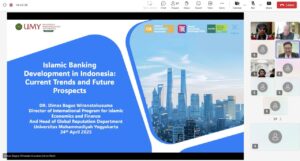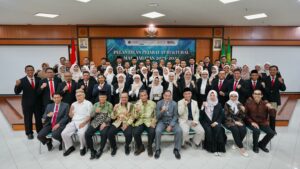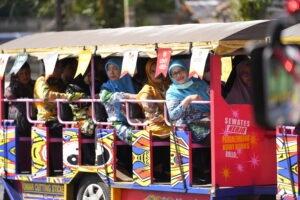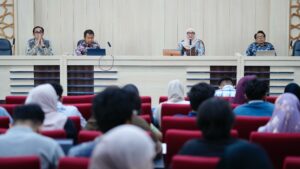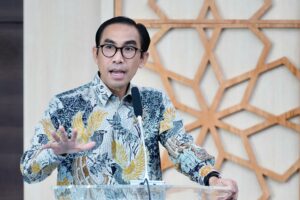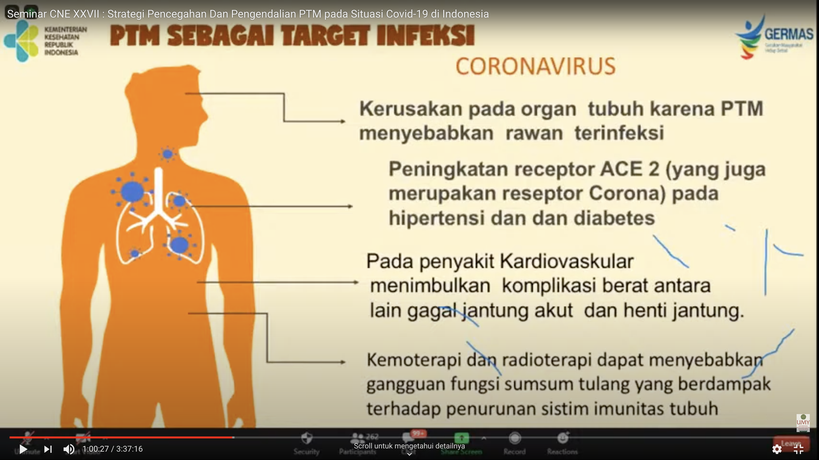 Non-communicable diseases or PTM are diseases that cannot be transmitted from person to person through contact. However, the death rate from these diseases is quite high in Indonesia. Continuing Nursing Education (CNE) of the Nurse Professional Study Program, Universitas Muhammadiyah Yogyakarta discussed this in the annual seminar “CNE XXVII: Strategies for Prevention and Control of PTM in the Covid-19 Situation in Indonesia”. The seminar which was held on Saturday (26/9) took place online through zoom and was livestreamed on Youtube so that it could be widely watched by nurses, medical personnel and the public in general.
Non-communicable diseases or PTM are diseases that cannot be transmitted from person to person through contact. However, the death rate from these diseases is quite high in Indonesia. Continuing Nursing Education (CNE) of the Nurse Professional Study Program, Universitas Muhammadiyah Yogyakarta discussed this in the annual seminar “CNE XXVII: Strategies for Prevention and Control of PTM in the Covid-19 Situation in Indonesia”. The seminar which was held on Saturday (26/9) took place online through zoom and was livestreamed on Youtube so that it could be widely watched by nurses, medical personnel and the public in general.
This CNE seminar is a form of devotion from the UMY Nurse Professional Study Program and its alumni towards nurses in particular and society in general. “Since 2010, PTM has been included in the top 5 causes of death in Indonesia, some PTM that are often found in Indonesia are stroke, systemic heart disease, cancer, and diabetes mellitus. In the midst of this COVID-19 pandemic, I think patients with PTM also need special treatment because it can become a participant disease or comorbidity because it can cause a high number of fatal cases in Indonesia. So people with PTM must be aware of themselves, “said Tri Prabowo, S.Kp, M.Sc, chairman of the PPNI DIY DPW in the opening of the seminar.
Meanwhile Arianti, M.Kep., Ns., Sp. Kep. MB, the Head of the UMY Nurse Professional Education Study Program also voiced the same thing regarding the selection of topics raised at this year’s seminar. “The topic was chosen because the main risk factors for being exposed to COVID include diseases such as Diabetes Mellitus and Hypertension. In this seminar, we discussed the importance of preventing patients with PTM from being exposed to COVID and how to react if they are exposed to COVID. That is why it is urgent for us to choose this theme.” She said.
This online seminar activity which was attended by as many as 1000 participants discussed material related to the risks of people having PTM during the pandemic, as explained by one of the seminar speakers, Dr. Theresia Sandra Diah Ratih, MHA, Head of the Sub-Directorate of Chronic Lung Disease and Immunological Disorders and the Directorate of Prevention and Control of Non-Communicable Diseases, Ministry of Health. She stated that it is very important to maintain one’s health during a pandemic, especially for people with PTM. “One of the strategies to prevent PTM is implementing a healthy life by managing a healthy diet and sufficient nutrition and doing physical activities such as exercising. During a pandemic, people with PTM are very much at risk of contracting COVID-19, therefore they must be able to take care of themselves and always check themselves at the nearest health service regularly, “said Theresia.
Completing Dr. Theresia’s explanation, the next speaker also said the same thing regarding maintaining a healthy lifestyle. “A healthy lifestyle is the main key, it must be maintained at all times. In addition to maintaining a healthy lifestyle, at this time we must also be able to take advantage of technology because now technology is indispensable to access any information. For example for doctor consultation, or seeking information for early prevention, “added Drh. Berty Murtiningsih, M.Kes, an expert that also spoke in the seminar.
Through this seminar, it is hoped that many nurses and medical officers will make strategies to prevent and control COVID prevention, especially for people who have a history of PTM. Nurses and medical officers are also expected to be able to implement the provision of the latest care for PTM patients, because nurses play an important role in the frontline and must be more strategic, especially in providing care to the community for COVID response “Our hope is that as an educational institution engaged in the health sector, we can provide the latest knowledge updates related to the prevention of COVID for COVID patients with PTM so that nurses care more about PTM patients and COVID transmission can be reduced, “concluded Arianti.

